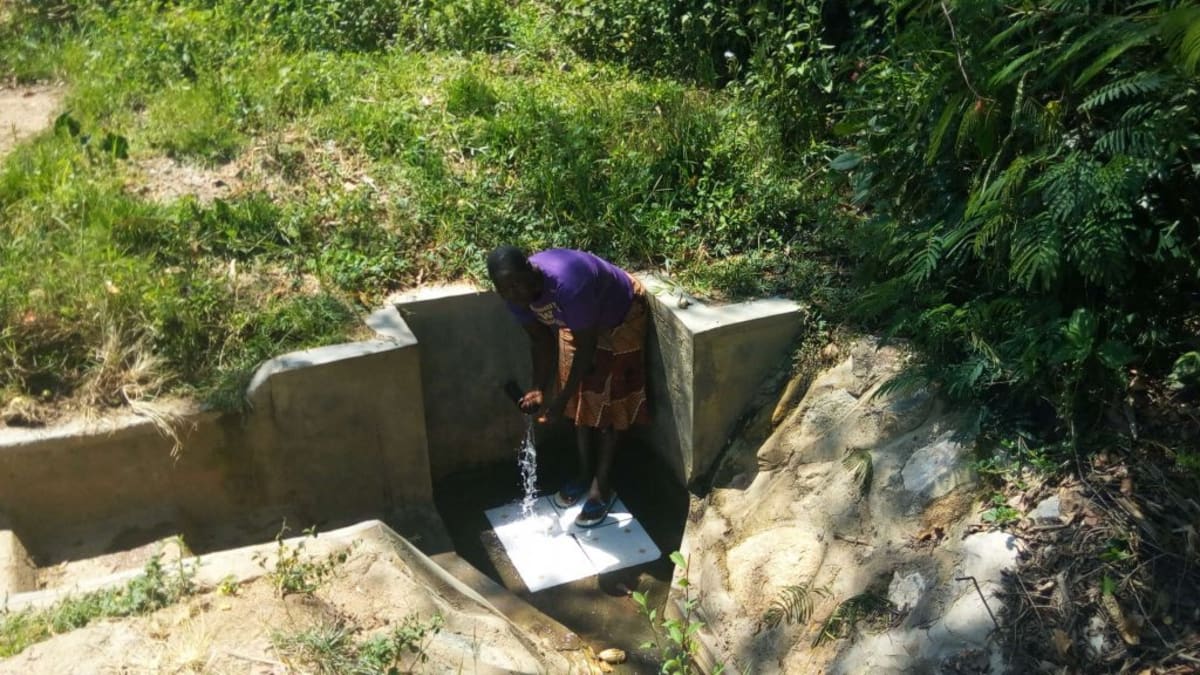This project is a part of our shared program with Western Water and Sanitation Forum (WEWASAFO). Our team is pleased to directly share the below report (edited for clarity, as needed).
Welcome to the Community
Mukhonje Village is highly populated, with about 600 people from 85 different households. (Editor's Note: While this many people may have access on any given day, realistically a single water source can only support a population of 350-500 people. This community would be a good candidate for a second project in the future so adequate water is available. To learn more, click here.)
Normal days in this village start even earlier than those in neighboring communities. The men wake up and go directly to where they are brewing alcohol from sugarcane. After they've checked on that, they'll head to the sugarcane plantation. This all happens around 5 am, when the children are forced to rush to the unprotected spring and fetch water to prepare breakfast and baths. Women are on their toes finishing the house chores so that they can later join their husbands on the farm. If not working on a sugarcane farm, a woman might be found in her own household garden nurturing cassava or potatoes. If the family has harvested enough crops, a woman might also venture to the local market to set up a booth.
Since everybody here has such a busy schedule, there is very little crime.
Water Situation
The water source this community relies on is Ogola Spring. Its water is used for drinking, cooking, cleaning, watering animals, and irrigating farms during the dry season.
The children bring small cups or bowls to help fill a larger jerrycan. If this small container is forgotten, a person is forced to cup their hands and fill the jerrycan. Since the source is unprotected, it is open to contamination from many different sources. When it rains, feces, chemicals, and other waste can wash into the water. Animals have free reign to drink directly from the water. Since so many households rely on Ogola Spring, it is often over congested with long waiting lines. During our visit, contamination was evident, and locals described the constant illnesses suffered after drinking this water. Most living here have spent a lot of money treating diarrhea and typhoid.
Sanitation Situation
Over half of households have pit latrines, but most of them are in bad shape. Floors are made of mud and cow dung, and the walls are made of woven banana fibers. Less that a quarter of families have a place to wash their hands after using the latrine. They don't even have helpful tools like dish racks and clotheslines to dry belongings up off the ground. Trash disposal is a huge concern in this area. Most families tend to throw their garbage in the kitchen garden, and the others just throw it all over the compound.
Mr. Gerishon Matsanza, the assistant chief, took us on a tour of his village. He said, "I am humbled by your visit in our community, but am totally ashamed to disclose the health situation at hand. Indeed we are lagging behind in terms of developments since most of the people have been spending time and resources going to the hospital. This is because most are affected by typhoid and diarrhea and also lack proper information on sanitation and hygiene, thus causing their health to deteriorate."
Plans: Hygiene and Sanitation Training and Sanitation Platforms
Community members will attend hygiene and sanitation training for at least three days. This training will ensure participants are no longer ignorant about healthy practices and their importance. The facilitator plans to use PHAST (Participatory Hygiene and Sanitation Transformation), CLTS (Community-Led Total Sanitation), ABCD (Asset-Based Community Development), group discussions, handouts, and demonstrations at the spring. On the final day of training, participants will select five families that should benefit from new latrines that have sanitation platforms (concrete pit latrine floors). The sessions will result in the formation of a water user committee that will oversee and maintain the spring protection. It will also result in the education of community health workers who are tasked with educating other neighbors in the village.
Based on our tour of the community, we've decided to highlight water handling and storage, waste disposal, and hand-washing.
Training will also inform the community and selected families on what they can do to help make this project a success. They will mobilize local materials such as bricks, clean sand, hardcore, and ballast. The five selected families will also prepare by sinking a pit for sanitation platforms to be placed over. All community members will work together to make sure that accommodations and food are always provided for the work teams.
Plans: Spring Protection
Community members have agreed to start collecting the materials need for construction. These include sand, rocks, ballast, and hard core. When our artisans arrive, families living around the spring will offer accommodation and food. The community's help with this project will contribute to the ownership and responsibility they take towards the spring protection.
When Ogola Spring is protected, community members will be able to spend valuable time that was previously wasted on more constructive activities. The cases of diarrhea and typhoid will decrease.
Protecting the spring will ensure that the water is safe, adequate and secure. Construction will keep surface runoff and other contaminants out of the water. The sanitation facilities and trainings will also enable, enlighten and build the capacity of the community so that they can take matters into their own hands.

 Protected Spring
Protected Spring
 Rehabilitation Project
Rehabilitation Project































